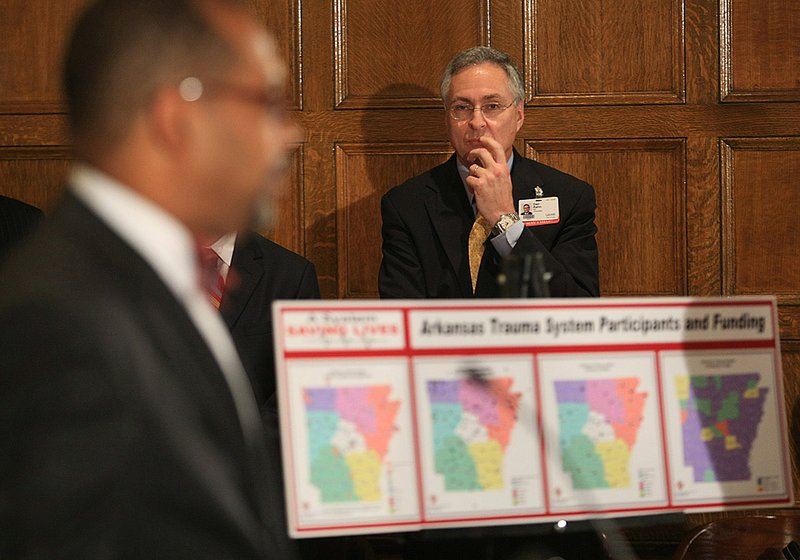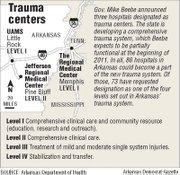LITTLE ROCK — Gov. Mike Beebe announced Tuesday the first three hospitals designated as trauma centers in the state’s planned trauma system, which he expects to be fully operational within two years.
The University of Arkansas for Medical Sciences in Little Rock and the Regional Medical Center at Memphis were designated Level I centers, the most extensive classification. Jefferson Regional Medical Center in Pine Bluff was granted a Level II designation.
Before a review board approved the three hospitals, Arkansas was the only state in the country without a designated trauma center, Beebe said.
“This is a big day for Arkansas,” he said. “These centers will form the cornerstone of our system.”
The Arkansas Trauma System will connect emergency medical services statewide, with the goal of getting patients who have traumatic injuries the specific care they need as quickly as possible.
Arkansas is among three states that don’t yet have fully operational trauma systems.
The system is funded by an increase in tobacco taxes that was signed into law in 2009. About $11.4 million in grants have been distributed for training, hospital improvements and ambulance upgrades, a news release from the Arkansas Department of Health said.
Eligible hospitals can seek one of four levels-of-care designations, with Level I being the most extensive and Level IV being the least demanding on a hospital’s resources.
“Sometimes it’s best to skip three hospitals to go to the one with the right surgeon on duty at that moment,” Beebe said.
Organizers hope the trauma system will improve the level of care offered between the time of an injury and the treatment for it. If a patient is treated during the hour immediately after the injury, known as “the golden hour,” he is more likely to be rehabilitated to his pre-injury state, Health Department Director Paul Halverson said.
Arkansas’ injury-related mortality rate is 50 percent higher than the U.S. average, he said. Organizers expect the trauma system to reduce injury-related deaths by 25 percent.
“This is an important step for us,” Halverson said of establishing the system’s first centers.
A communications center designed to link regional emergency medical service providers and hospitals throughout the state and determine the best source of care to match a given injury should be in place in early 2011, he said.
The three hospitals recognized Tuesday are the first to meet accreditation standards for their designations.Their status has been verified through extensive documentation and site visits by a review team, which is made up of accredited physicians who have completed a Health Department trauma review course.
Seventy-three of 86 eligible Arkansas hospitals have applied to become trauma centers, Halverson said.
Additional hospitals will gradually be approved. Halverson expects most of the trauma centers to be approved in the next two years.
“It’s not a switch that gets turned on and, all of the sudden, there’s a system,” Halverson said. “It happens gradually.”
Some hospitals that initially chose not to apply as trauma centers, such as three large hospitals in Benton and Washington counties, have signed on in recent months.
Little Rock’s Arkansas Children’s Hospital is the only other in-state applicant for Level I trauma center designation.
A team will soon review the hospital to ensure that it meets rigorous resource and staffing requirements, Halverson said.
Level I trauma centers are required to have general and specialized surgeons on duty 24 hours a day to treat patients with the most severe and complex injuries. They must also do research, outreach and safety education aimed at preventing injuries in their communities.
Dr. Dan Rahn, chancellor of UAMS, said the hospital has functioned like a Level I trauma center even before it received the official designation.
“Time is life when it comes to major trauma,” he said.
Dr. Reginald W. Coopwood, president and chief executive officer of the Regional Medical Center at Memphis, said the hospital has already cared for eastern Arkansas patients in its Elvis Presley Memorial Trauma Center. The designation will help it collaborate with Arkansas hospitals.
The Pine Bluff hospital received Level II designation, which means it must have general and specialized surgeons available around the clock, but it is not required to complete research and community outreach to the degree that Level I centers do.
Arkansas’ organizers have established a system in a relatively short amount of time, said Dr. Todd Maxson, a consultant for the Health Department and trauma director at Arkansas Children’s Hospital.
“What you’re doing in Arkansas is known by experts across the country,” he said. “The speed at which this system is coming along is unprecedented nationally.”
The designations last for four years, after which they come up for renewal.
Front Section, Pages 1 on 09/29/2010

